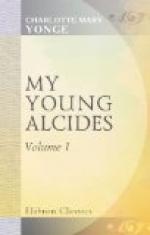Mrs. Kingston looked amazed. I set to work to talk them both down, and must have given a very wild, nervous account of the disaster. At last Dermot opened the door for Harry, who came in, looking very pale, with one hand entirely covered and in a sling, the other bound up all but the thumb and forefinger. To our anxious inquiries, he replied that the pain was much better now, and he should soon be all right; and then, on being further pressed, admitted that the little finger had been so much crushed that it had been taken off from the first joint, the other three fingers had been broken and were in splints, and the right hand was only torn and scratched. Mrs. Kingston exclaimed at this that Mr. Yolland should have waited for the doctor to venture on such an operation, but both Dermot and Harold assured her that he could not have waited, and also that it could not have been more skilfully done, both of which assurances she must have heard with doubts as to the competence of the judges, and she much regretted that she could not promise a visit from her doctor that evening, as he was likely to be detained all night.
Dermot came downstairs with us, and we found Mr. Yolland waiting at the door to extract a final promise that Harold would go to bed at once on coming home. It seemed that he had laughed at the recommendation, so that the young surgeon felt bound to enforce it before all of us, adding that it was a kind of hurt that no one could safely neglect. There was something in his frank, brusque manner that pleased Harold, and he promised with half a smile, thanking the doctor hastily as he did so, while Dermot Tracy whispered to me, “Good luck getting him; twice as ready as the old one;” and then vehemently shaking all our hands, to make up for Harold’s not being fit to touch, he promised to come and see him on the morrow. The moment we were all in the carriage—Eustace still too much shaken to drive home—his first question was, who that was?
“Mr. Tracy,” I answered; and Eustace added, “I thought you called him Dermont?”
“Dermot—Dermot Tracy. I have known him all our lives.”
“I saw he was a gentleman by his boots,” quoth Eustace with deliberation, holding out his own foot as a standard. “I saw they were London made.”
“How fortunate that you had not on your Sydney ones,” I could not help saying in mischief.
“I took care of that,” was the complacent answer. “I told Richardson to take them all away.”
I don’t think Harold saw the fun. They had neither of them any humour; even Harold was much too simple and serious.
Eustace next treated us to a piece of his well-conned manual, and demonstrated that Dermot St. Glear Tracy, Esquire, of Killy Marey, County Cavan, Ireland, was grandson to an English peer, great grandson to an Irish peer, and nephew to the existing Edward St. Glear, 6th Earl of Erymanth. “And a very fashionable young man,” he went on, “distinguished in the sporting world.”




